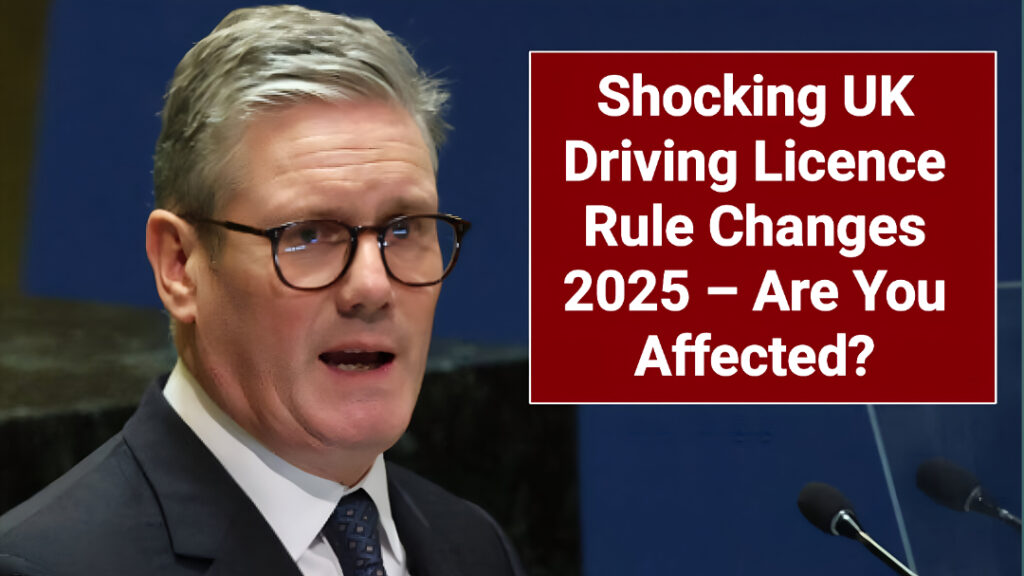UK Driving Licence Rule Changes 2025: The UK government has announced major and shocking changes to driving licence rules in 2025, leaving millions of motorists curious and slightly worried about how these updates will affect their everyday lives. From stricter medical checks to a complete transition towards digital licence systems, these updates are designed to improve road safety, reduce fraud, and modernise licensing. While some drivers welcome the changes as a step toward the future, others fear added costs, complexity, and challenges—especially pensioners and those less familiar with technology.
New Digital Driving Licence System
In 2025, the UK will begin a full transition towards digital driving licences, which will be available through the official DVLA app. This means drivers no longer need to carry a plastic physical card at all times, though the option will still remain for those who prefer it. The digital licence format will include photo identification, licence number, address, and expiry details, making it easier for both drivers and authorities to verify information instantly. This digital shift is also expected to cut down on fake licences and improve convenience for drivers during checks or renewals.
Stricter Medical Checks for Older Drivers
One of the most debated updates is the requirement for stricter medical checks for UK drivers aged 70 and above. Pensioners will now need to provide updated health records, including regular vision, hearing, and reflex tests, to renew their driving licences. This change aims to ensure safety for both older motorists and other road users. While it may feel like an added burden for some, the government insists it will help maintain independence for pensioners who are genuinely fit to drive, while preventing accidents caused by declining health conditions.
Changes in Renewal Periods
The driving licence renewal period is being shortened for certain age groups, marking another big shift in the 2025 rules. Younger drivers under 25 may face more frequent licence checks due to their higher accident statistics, while older drivers must now renew every three years after the age of 70. This new rule is part of the government’s strategy to monitor road safety more effectively and reduce risks. Drivers are being encouraged to keep a close eye on renewal dates to avoid fines or penalties.
Impact on Professional Drivers
Taxi drivers, lorry drivers, delivery drivers, and other professional motorists are also affected by the new regulations. Additional background checks, criminal record updates, and regular medical tests will now be mandatory before licence renewals. This ensures that individuals responsible for transporting goods and passengers are physically and mentally fit for the job. For employers, this could mean additional paperwork and costs, but for passengers and clients, it means greater peace of mind when travelling.
Driving Licence Fees Update
With these new rules, licence renewal fees are also being updated across the UK. While digital licences may be offered at a slightly reduced cost due to lower administrative expenses, physical card renewals could become more expensive. The government argues this pricing shift is fair since digital systems reduce paperwork and are eco-friendly. However, some drivers, particularly older ones, worry about being forced into paying more if they prefer to keep their traditional plastic cards.
Penalty Points and Driving Offences
The new 2025 driving licence rules also introduce stricter penalties for driving offences, especially for failing to renew licences on time or providing incorrect information. Drivers caught using expired or invalid licences could now face larger fines, more penalty points, and even temporary suspensions. In serious cases, repeat offenders may face prosecution. The aim is to ensure that only safe and responsible drivers remain on UK roads.
How This Affects UK Pensioners
For pensioners, the licence renewal process may feel longer and more complicated under the 2025 rules. With stricter health checks and shorter renewal periods, many older drivers fear losing their freedom and independence. However, the government has promised extra support through simplified digital applications, Post Office counter services, and helplines. Charities supporting older people are also urging pensioners not to panic and to seek assistance if they struggle with the new process.
Public Reaction to the Rule Changes
The public reaction to the 2025 rule changes has been mixed. Younger drivers are excited about the convenience of digital licences, while many older drivers and rural residents express concern over technology barriers and internet access. Some motorists feel the rules are a step in the right direction for safety, while others criticise them as another government overreach. Social media has been buzzing with debates, with petitions already circulating to make the digital system optional rather than the default.
Government’s Reason Behind the Changes
Officials argue that these driving licence changes are necessary to modernise the UK’s road systems and improve safety standards. With increasing accident statistics, a growing population of ageing drivers, and the rise of digital technology, the government believes these reforms will reduce risks, prevent fraud, and make driving administration more efficient. They also claim that digital licences will help the UK stay aligned with global standards, as many countries are already moving in this direction.
What Drivers Should Do Now
UK motorists are advised to check their licence expiry dates, prepare for digital applications, and stay updated on DVLA announcements to avoid problems. Those approaching renewal age should arrange medical checks in advance and ensure all personal details, such as address and contact information, are accurate. Preparing early can save time, avoid unnecessary penalties, and help drivers adapt smoothly to the 2025 changes without last-minute stress.
Conclusion
The 2025 UK driving licence rule changes represent one of the most significant driving reforms in decades. While the transition to digital licences, shorter renewal periods, and stricter medical checks may create challenges, the long-term benefits focus on road safety, fraud prevention, and modernisation. Whether you’re a young driver, a professional motorist, or a pensioner, staying informed and prepared will ensure you are not caught off guard by these new rules.
